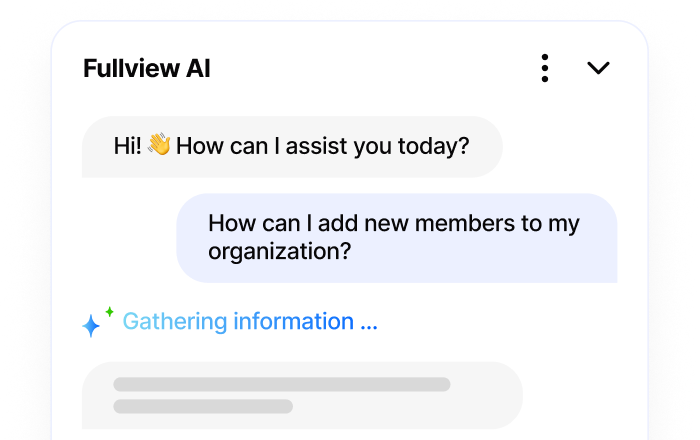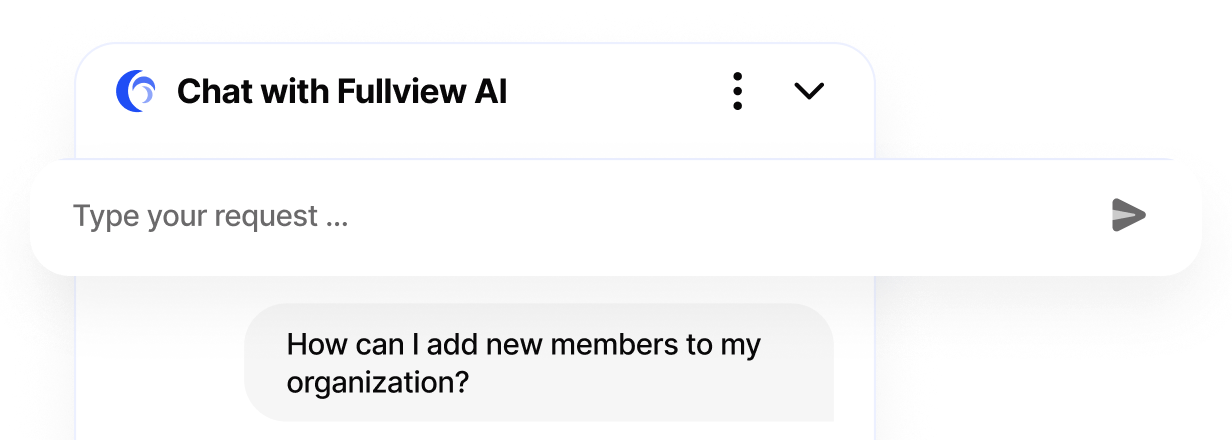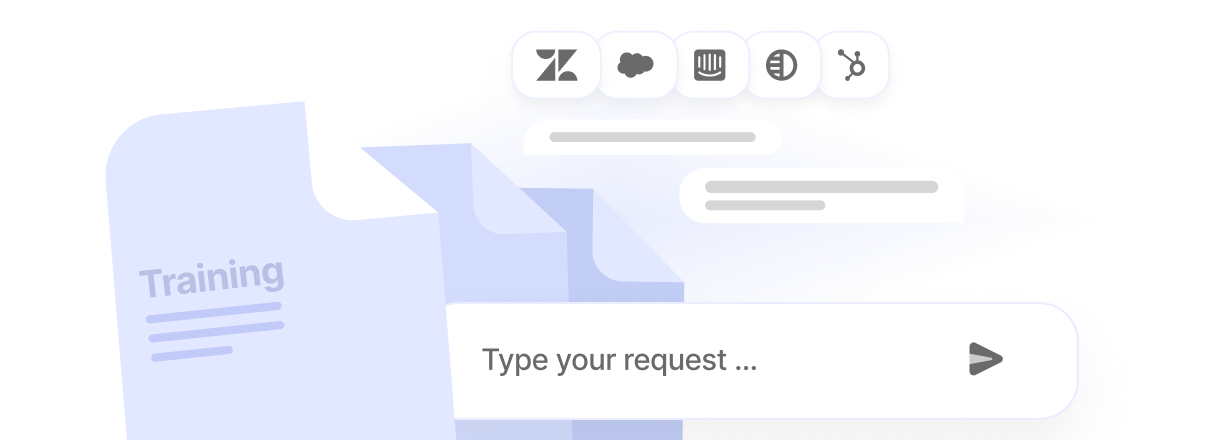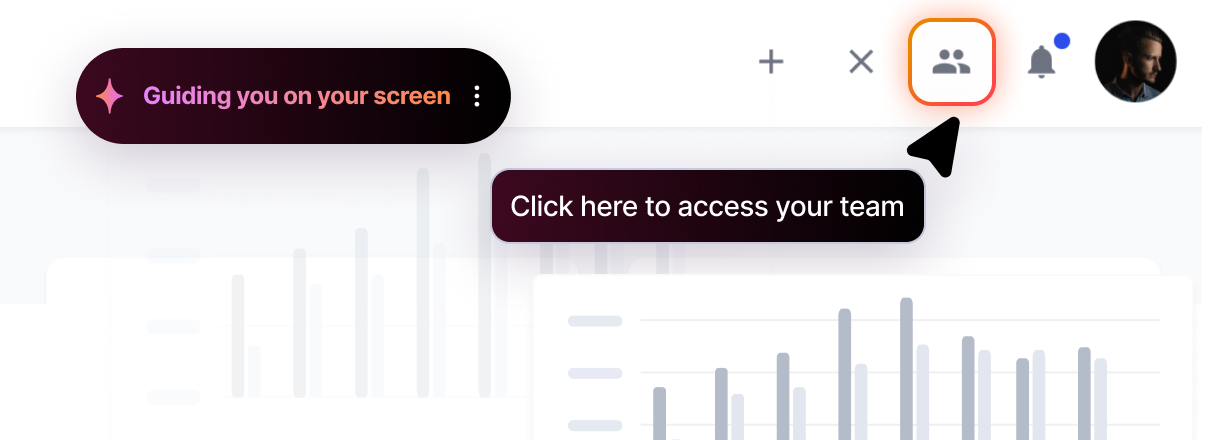TLDR: Support leaders face a perfect storm in 2025. Customer expectations for instant resolution have never been higher while cost-to-serve pressures mount across every industry. The solution? AI customer service automation platforms that deliver measurable ROI. In this comprehensive analysis, you'll discover 15 vetted AI tools, our scoring framework for evaluation, and ROI benchmarks you can take to the board. The standout trend: autonomous agents like Fullview are replacing passive chatbots, delivering the best AI chatbot for customer service capabilities that actually resolve issues end-to-end rather than just providing text responses.
Why Modern Businesses Need AI-Powered Customer Service
The customer service crisis has reached a breaking point. 52% of customers abandon companies entirely due to slow response times, while 59% will leave after just one poor experience. The financial impact is staggering: each abandoned call costs businesses $2.70-$5.60 per interaction.
Meanwhile, 90% of customers now expect instant responses, but the industry average response time remains stuck at 12 hours and 10 minutes. This massive expectation gap is killing customer relationships before they begin.
The old approach of throwing more human agents at the problem isn't viable. Contact center turnover has hit 44% annually while call volumes surged 20% since 2020. Here's where AI transforms the equation: AI customer support automation platforms boost agent productivity by 20-45%, turning your support team into a strategic advantage rather than a cost center.
From Rule-Based Chatbots to Autonomous Agents
The evolution of AI customer service technology has accelerated dramatically, creating three distinct generations of capability:
Rule-Based Bots (2015-2020): These first-generation systems operated on keyword triggers and rigid decision trees. While cheap at $0.01-0.05 per interaction, they achieved only 95% accuracy for scripted interactions and failed completely on unexpected queries. Think "press 1 for billing, press 2 for technical support" but in chat form.
LLM Chatbots (2021-2024): The current mainstream represents a quantum leap forward. These systems achieve 60%+ ticket deflection rates with natural language understanding and contextual conversations. Operating at $0.10-0.50 per interaction, they handle multiple languages and maintain conversation context across interactions.
Autonomous Agents (2025+): This emerging category, led by platforms like Fullview, represents the next frontier. An autonomous AI agent is software that interprets UI elements, executes clicks, form fills, and navigations end-to-end without RPA scripts. Unlike chatbots that only provide instructions, autonomous agents actually perform actions on behalf of users, completing tasks from start to finish.
Gartner predicts agentic AI will autonomously resolve 80% of common customer service issues without human intervention by 2029, making this the technology category that forward-thinking support leaders need to understand today.
New Expectations for Instant, Personalized Support
Customer expectations have fundamentally shifted, creating new table stakes for competitive customer service:
Speed: Sub-second response times are now possible, with leading AI platforms achieving 245-315 millisecond response times. This isn't just impressive. It's necessary. Delays over 10 seconds cause user frustration and abandonment.
Personalization: Modern AI delivers sentiment-aware responses and supports 100+ languages including cultural adaptation beyond simple translation. The best systems handle idioms, cultural nuances, and voice recognition across multiple languages—critical when 60% of non-anglophone consumers rarely purchase from English-only sites.
Omnichannel: Seamless handoffs across chat, email, and in-app widgets are no longer nice-to-have features. Customers expect their context and conversation history to follow them across every touchpoint, creating unified experiences regardless of communication channel.
Meeting these expectations demands the right AI customer service automation platform—one that can deliver on all three dimensions simultaneously while integrating with your existing tech stack.
How We Picked the 15 Best Tools
Our evaluation methodology prioritizes real-world performance over marketing claims, using a transparent scoring framework that enterprise buyers can replicate for their own vendor selection process.
Evaluation Criteria and Scoring Matrix
Compliance, Security, and Data-Masking Checks
Every platform in our analysis meets mandatory enterprise standards: GDPR (penalties up to €20M or 4% annual turnover), SOC2 (now standard for enterprise SaaS), HIPAA-BAA (required for healthcare applications), and PCI-DSS (mandatory for payment processing).
Fullview sets the security bar higher with pixel-level data redaction and comprehensive encryption-in-transit/at-rest, ensuring sensitive customer data remains protected even during screen sharing and co-browsing sessions.
Integration and Time-to-Value Factors
Key integrations we prioritized include CRM systems (Salesforce, HubSpot), ticketing platforms (Zendesk, Intercom), and analytics tools (Segment). Time-to-value is defined as days from installation to first resolved ticket—a critical metric for proving ROI to stakeholders.
Fullview's "no-manual-setup" advantage means you can be resolving customer issues within hours of deployment, not weeks of configuration.
Best AI Customer Service Tools
The following rankings reflect our comprehensive scoring matrix, with each tool earning its position through demonstrated performance across all evaluation criteria.
Fullview – AI Customer Service Agent with Visual Guidance
Fullview is the first AI customer service agent that does, not just tells. While other platforms provide text instructions, Fullview's autonomous agent actually navigates applications, fills forms, and resolves issues on behalf of customers—delivering true end-to-end resolution without handoffs.
Key Features:
- Autonomous Agent: AI that interprets UI elements and executes actions directly in customer applications
- Session Replays: Complete visual records of customer interactions for debugging and optimization
- Co-browsing: Real-time screen sharing that lets agents see exactly what customers see
- Real-time Console: Live technical diagnostics and error monitoring during support sessions
Security Excellence: Granular permissioning system and automatic PII masking ensure compliance across all industries, while pixel-level redaction protects sensitive data during visual sessions.
ROI Proof: Early customers report 35% faster issue resolution times, with the autonomous agent handling complex workflows that previously required multiple touchpoints and escalations.
Ready to see autonomous AI in action? Drop us a line for a personalized demo.
AI-First CX Suites (Intercom, Zendesk, Salesforce, HubSpot, Freshdesk)
These established platforms have invested heavily in AI capabilities while leveraging their existing market positions:
Intercom excels at conversational support with Resolution Bot achieving industry-leading deflection rates. Their innovative resolution-based pricing ($0.99 per resolution) aligns costs with outcomes. Ideal for: Mid-market SaaS companies prioritizing conversation quality.
Zendesk offers the most mature AI ecosystem with 1,800+ integrations and Answer Bot handling routine inquiries. Their AI-powered workforce management optimizes agent scheduling. Ideal for: Enterprise organizations requiring extensive customization.
Salesforce Service Cloud Einstein provides deep CRM integration and predictive case routing. Their AI analyzes customer data to surface relevant solutions proactively. Ideal for: Large enterprises already using Salesforce ecosystem.
HubSpot delivers unified platform benefits with ChatSpot AI handling sales and support inquiries seamlessly. Free tier makes it accessible for growing companies. Ideal for: Organizations wanting unified sales and service AI.
Freshdesk provides the best price-to-feature ratio with AI capabilities starting at $78/agent/month. Freddy AI handles ticket classification and agent assistance. Ideal for: SMBs needing enterprise features at accessible pricing.
Specialist Chatbots and Automation Add-ons
Ada focuses on AI-native reasoning with advanced natural language processing and zero-hallucination technology. Strong enterprise security and custom integrations. Best for: Large enterprises requiring sophisticated AI reasoning.
Forethought specializes in ticket routing and response automation, with Solve predicting optimal resolution paths. Particularly strong for high-volume support environments. Best for: Organizations prioritizing operational efficiency.
Tidio offers affordable chat-focused solutions starting at $26/month, with Lyro AI providing human-like responses for common inquiries. Best for: Small businesses needing immediate AI benefits.
Zoho Desk includes AI features at no extra cost in existing plans, with Zia AI providing sentiment analysis and anomaly detection. Best for: Existing Zoho ecosystem users.
Kustomer delivers 360-degree customer views with IQ automating conversation routing and providing agent recommendations. Best for: Organizations prioritizing customer context.
Drift combines sales and support AI with Revenue Acceleration Platform driving qualified conversations. Best for: B2B companies where support drives revenue.
Capacity handles complex workflow automation across departments, with AI Helpdesk managing multi-step processes. Best for: Organizations needing cross-functional automation.
Pylon targets modern B2B companies with native integration for Slack, Teams, and Discord—where today's customers actually communicate. Recent $17M Series A validates their specialized approach. Best for: Tech companies serving developer or technical audiences.
Cognigy provides enterprise-grade conversational AI with Forrester and Gartner recognition. Their $100M Series C funding enables continued innovation in agentic AI. Best for: Large enterprises requiring sophisticated voice and chat AI.
Key Benefits and ROI You Can Expect
Ticket Deflection and Faster Resolution Times
AI implementations consistently deliver 20-45% improvements in agent productivity, with customer service representatives saving 1.2 hours daily through AI assistance. Response times improve by 37-74% within the first year, while leading organizations achieve up to 87% reduction in average resolution times.
Fullview's autonomous agent represents the next evolution by resolving issues without handoffs rather than just accelerating human agents. This fundamental difference drives even greater efficiency gains.
Lower Cost per Interaction and Headcount Savings
The financial impact of AI customer service is substantial and well-documented. Organizations report 20-40% cost reductions through AI implementation, with some achieving up to 75% reduction in customer service costs through strategic automation.
The math is compelling: AI chatbots cost $0.50 per interaction versus $6.00 for human agents, a 12x efficiency advantage. Companies implementing comprehensive self-service solutions report annual savings of $3 million, while Gartner projects $80 billion in contact center labor cost savings by 2026.
Richer Product Insights for Continuous Improvement
AI customer service platforms generate unprecedented visibility into customer behavior and product performance. Session replay data, rage-click heatmaps, and console logs provide engineering teams with actionable insights for product improvements.
This feedback loop creates compound value. As AI helps customers more effectively, the data it generates helps product teams build better experiences, reducing future support volume. Leading organizations integrate these insights directly into engineering workflows through tools like Linear and Jira.
Frequently Asked Questions
How Is an Autonomous AI Agent Different from a Chatbot?
An autonomous agent understands your application's user interface, provides visual guidance to customers, and can execute clicks, form fills, and navigation actions end-to-end. A traditional chatbot only provides text instructions, leaving customers to figure out implementation themselves.
For example, when a customer can't find a billing setting, a chatbot says "Go to Account Settings > Billing > Payment Methods." An autonomous agent like Fullview actually navigates to that location, highlights the relevant buttons, and can complete the action on the customer's behalf.
How Do AI Tools Keep Customer Data Secure and Compliant?
Leading AI customer service platforms encrypt data in transit and at rest, implement role-based access controls, and maintain compliance with GDPR, SOC2, HIPAA-BAA, and PCI-DSS standards. Penalties for non-compliance range from €20 million (GDPR) to $50,000+ per violation (HIPAA), making vendor compliance verification essential.
Advanced platforms like Fullview add pixel-level data redaction during screen sharing, ensuring sensitive information remains protected even during visual support sessions.
What Hidden Costs Should I Watch for When Evaluating AI Support Software?
Common hidden costs include usage-based overages (especially for high-volume implementations), mandatory professional services for setup and training, and add-on fees for advanced features like sentiment analysis or custom integrations.
Resolution-based pricing models (like Intercom's $0.99 per resolution) can provide more predictable costs than traditional per-seat pricing, especially for organizations with variable support volumes.
How Can I Measure ROI from AI Customer Service Initiatives?
Track key metrics including average handle time, ticket deflection rate, CSAT improvements, and cost per interaction before and after deployment. ROI typically follows a clear progression: 41% in year one, 87% in year two, 124% by year three.
Leading indicators include first response time improvements (visible within 30-60 days) and agent productivity gains (measurable within 90 days). The most successful implementations show measurable improvements within the first quarter: 45% improvement in first response time and 8% CSAT increase are realistic early benchmarks.
Ready to Transform Your Customer Service? The shift from reactive support to proactive, AI-powered customer success isn't coming. It's here. Organizations implementing autonomous AI agents today are building sustainable competitive advantages while their competitors struggle with traditional chatbot limitations.
Want to see how Fullview's autonomous agent can revolutionize your customer support? Schedule a demo and experience the future of AI customer service firsthand.








.webp)
